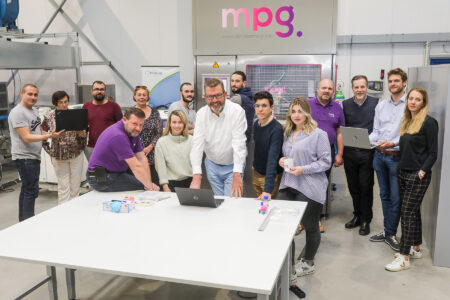Molecular Plasma Group (MPG) was created in 2016 as a spin-off from the Luxembourg Institute of Science and Technology (LIST) to commercialise a unique nano coating technology using cold atmospheric plasma. “We knew that we had a fantastic technology able to fix organic molecules onto any surface in a permanent way, thereby changing its functionality,” says CEO Marc Jacobs. “In order to find out how to use it to bring real value to customers, we initiated 50 proofs of concept with various clients that all focused on enabling adhesion to very difficult substrates.”
This opened our eyes to a new market with huge potential.
 The company positioned itself as a technology platform, and trademarked its solution as MolecularGripTM. The focus was on major players in the field of gluing and on robotics technology integrators that could use the technology in their industrial production lines. However, through a proof of concept realised together with the university KU Leuven, the company was able to show that it could fix biomolecules such as antibodies onto glass substrates in 10 seconds, rather than the current industry standard of 24 hours.
The company positioned itself as a technology platform, and trademarked its solution as MolecularGripTM. The focus was on major players in the field of gluing and on robotics technology integrators that could use the technology in their industrial production lines. However, through a proof of concept realised together with the university KU Leuven, the company was able to show that it could fix biomolecules such as antibodies onto glass substrates in 10 seconds, rather than the current industry standard of 24 hours.
“This opened our eyes to a new market with huge potential,” says Mr Jacobs. In order to move forward, MPG successfully applied to the healthtech vertical of accelerator programme Fit 4 Start. “This helped us develop a roadmap and enabled us to initiate proofs of concept with several global biomedical players.”
Research partnership for virucidal and environmentally facemasks
When the COVID-19 pandemic broke out, the MPG team looked into using its technology to graft a virucidal coating onto personal protective equipment. “Our idea got an enthusiastic response from local hospitals,” recalls Mr Jacobs.
MPG set up a collaborative research partnership with LIST, the Luxembourg Institute of Health (LIH), the Robert Schuman hospital group and medical supply chain solutions and healthcare services provider Santé Services. With co-funding from the Ministry of the Economy, they developed a method for grafting molecules of citric acid – a natural substance used as a flavouring and preservative in food and beverages – onto facemask material. “This is the safest and most environmentally friendly solution that could possibly be imagined – but it only works with our technology,” Mr Jacobs points out.
This is the safest and most environmentally friendly solution that could possibly be imagined – but it only works with our technology.
Together with its partners, MPG also developed the machinery needed to industrialise the process as well as an in-line inspection technology for the coatings – a critical step, as the coatings are measured in nanometres and quality control must be extremely precise. So far, MPG has sold machines to industrial partners in Luxembourg and Belgium. Requests are coming from all over the world, and the company is working on a big test order for the Asian market. “The cost for adding the coating is really insignificant. There is no reason why this should not be a new global standard.”
Credibility and maturity: the main benefits
With simple adjustments, the industrial machines can be adapted to treat plastics, textile or even steel sheets. “In one single year, we did work with LIST and LIH that would normally take 3-5 years,” Mr Jacobs underlines. “The outcomes of our R&D partnership catapulted us from a start-up to a mature company with a proven industrial technology that is integrated into the medical device production chain. The credibility and maturity that we gained are also opening up other markets: we have already delivered a system for an automotive pilot line and are close to a delivery in the field of electronics. Our focus is now on scaling and selling our offering.”
The outcomes of our R&D partnership catapulted us from a start-up to a mature company with a proven industrial technology.
Several new R&D collaborations with LIST focusing on industrial topics are in the pipeline. “There are so many fields where our technology can make a real difference, and with our fantastic team of scientists, engineers and support staff, we will make many of them happen.”
Photo: © Luxinnovation / Luc Deflorenne

